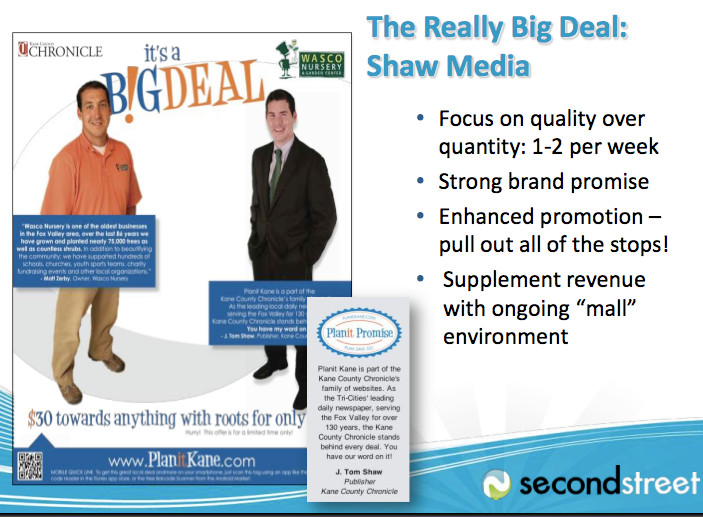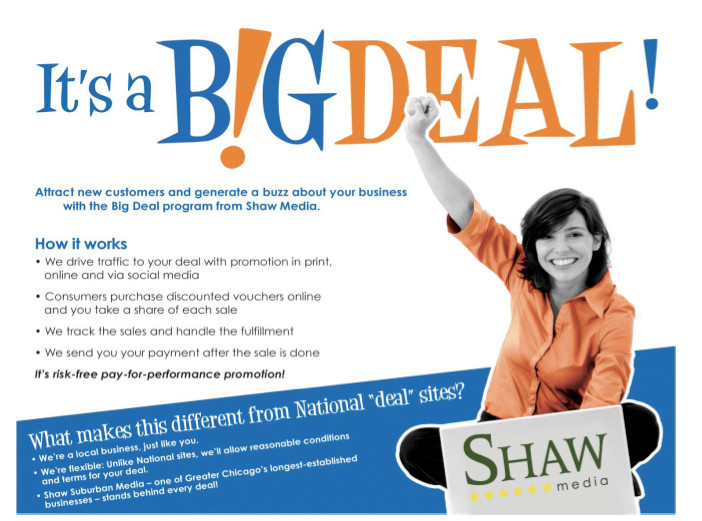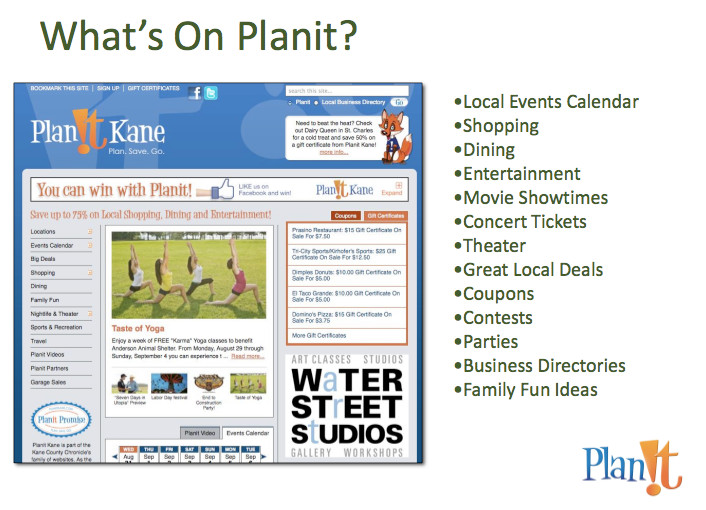The Big (weekly) Deal, plus deal stores, earn top dollar at Shaw
Company: Shaw Media, a group of 12 newspapers and 38 web properties based in Illinois and Iowa
Initiative: Planit deal store and weekly Big Deal
Markets: Three suburban areas, Kane County, Dekalb County, and McHenry County, in Illinois, each with a daily and website.
Key executives: Ben Shaw, Chief Digital Officer; John Rung, Senior VP of Media Operations and program founder, and publisher of the Northwest Herald; J. Tom Shaw, Publisher, Kane County Chronicle and program manager; and Don T. Bricker, Publisher, Daily Chronicle.
Summary
While many companies are now testing seasonal deal stores, Shaw Media decided to focus its energies on one really big deal per week plus a ongoing certificate store - and is on-track to bring in $300,000 to $400,000 per year in certificate sales, according to LMI estimates. The new sites, planitnorthwest.com, planitkane.com and planitdekalcounty.com, include a video gallery of merchants, coupons and social media feeds.
Advertising packages are paid in a combination of cash and vouchers sold in the store. The PlanIt Guarantee on weekly deals is promoted by publishers, who appear in ads to personally back-up the quality of the deal, Lee Iacoca-style.
The combination works: One deal for an indoor water park won SecondStreetMedia's award for Top Recreational Deal, earning $78,000. The program is now one of the two top-revenue producing digital programs at Shaw.
Challenge
Top executives at family-owned Shaw Communications, a group of 12 newspapers and 38 web properties throughout Illinois and Iowa, wanted to enter the deal space. However, a market test in Newton, Iowa showed that keeping up with a daily deal would be difficult, if not impossible, in many small markets. Growing consumer interest in deals and coupons spurred executives to enter the market in a committed, innovative way.
Strategy
Shaw Media built a shopping platform, PlanIt, in-house after a partnership with Localthunder ran out of steam. The new platform allows merchants to sell gift certificates in an ongoing store, or partner with the media company one big, quality deal per week, both powered by SecondStreet media. So far the platform has rolled out in three Shaw markets as of March, 2012, with more markets lined up for the rest of the year. Here are the key components within the initiative:
1.Certificate stores
Most ongoing certificate stores reviewed on this site have been the standalone, all-trade variety,and are proving to yield sizable revenues in small markets, by trading 200% in certificates for 100% of advertising, and then the price of certificates down to 50% and selling them to consumers directly.
Shaw’s model is similar; but with a twist. Their advertising packages include a suite of integrated online products, such as a showcase page, video, and the ability to sell gift certicates in the store, as well as advertising. Merchants typically pay some of the cost in vouchers that are sold in the store, with a few, such as restaurants, allowed to pay 100% in vouchers. Here is how the certificate stores look aggregated online and promoted in print ads:
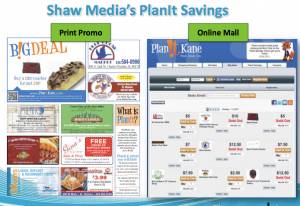
The approach keeps the certificate shopping marketplace "full," ie stocked with inventory from many different kinds of businesses; and integrates the certificates with a variety of other digital marketing options.
2.The Big Deal Weekly
Weekly deals have unique advantages in small markets. They allow the organization to focus on just those 52 weeks a year, and concentrate advertising horsepower for the entire week. The combination of better deals and more advertising is a win/win for the media company and the merchant.
At the 2012 Key Executives Mega-Conference, Ben Shaw gave e key reasons for a weekly, versus daily deal:
A. In small markets, one good deal one instead of many "just ok" ones strengthens the brand
B. A week to select and market a deal sharpens focus and maximizes marketing for the client.
C. Marries well with a certificate store - ie they still have on-going, discounted Gift Certificates in the Planit store.
Every month or so, publishers 'back the deal' by posing with the merchant in photographs used for the advertising. An example is their largest deal to date - and SecondStreetMedia's Top Recreational Deal of 2011 - for KeyLime Cove, a popular indoor water park. KeyLime offered a deal that included $99.95 for a standard, accomodations for four people, four water park passes, and ran the deal group wide. KeyLime also put the deal on their own web site. The result was more that $78,000 in sales in 5 days.
Shaw's advice on making a deal take off: First and foremost, it was a fabulous deal." Indoor waterparks are very popular in our area. And 50% off of family fun on this scale was very attractive." Second, Shaw Media was flexible and offer them aggressive print and rich media promotional consideration. Finally, KeyLime send the email on to their own huge database. Here are Shaw executives, taking one for the team:

3.The Planit Guarantee 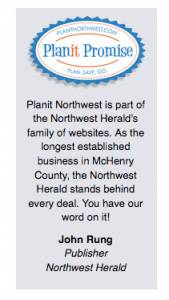 The Planit Guarantee that runs on the ads and online provides a seal of approval by the publisher, "As the longest established business in McHenry County, the Northwest Herald stands behind every deal. You have our word on it."
The Planit Guarantee that runs on the ads and online provides a seal of approval by the publisher, "As the longest established business in McHenry County, the Northwest Herald stands behind every deal. You have our word on it."
Since these are small markets, local publishers have deep roots in the community. Publishers like it and the full force of the newspaper's credibility is brought to bare. The local brand helps differentiate Planit deals from competitors'.
4.The rest of the package: Presence on the shopping site
PlanIt stores includes a showcase page where merchants can post the certificates, as well as photos, videos, menus, reviews, and contests and share these on Facebook and Twitter. The front of the site also includes a calendar of local events that appeal to female shoppers over age 35, its core demographic. Here is a sample showcase page:
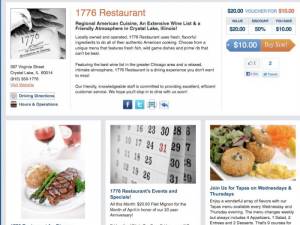
Merchants get extra valuable perks in their packages: a videographers will create the merchants' video ad and there are a specified number of mentions in Planit's own email list, Facebook page and Twitter feeds.
6. Selling PlanIt
Tiered packages, all "in the hundreds" per month, combine a showcase page with videography, advertising, a number of times mentionned on Twitter and Facebook under the PlanIt avatar and in its weekly email blast. Advertisers are allowed to pay with a combination of cash and vouchers, depending on the type of business.
As part of the launch, a contest challenged sales forces in the three launch markets to sign up 40 pages each, and ended up with 249 new businesses on the three platforms. The flexibility in negotiating with merchants has kept the store stocked and advertisers happy.
"There is an opportunity for restaurants, who can't afford to pay cash to pay 100% in vouchers," said Ben Shaw, adding that restaurants account for most of the deal sales. If a business's certificates are less likely to sell, at least 50% cash is required.
Both the store and weekly deal are often presented on a sales call.
"If you want to make a big splash in a short time, driving attention to a big deal is a way to go. If you need a presence in the local online market, you want the showcase pages," J. Tom Shaw says. "Some businesses may want both, and once a quarter create a big deal."
The local sales staff is able to sell all digital platforms, but specialists help them acquire larger ecommerce deals.
Results:
About 50% of revenues for the site comes from weekly deals, the rest from certificate stores. This ratio proves that the deal stores are a success, though a huge weekly deal that ‘becomes a whopper’ will always outperform the store that week or even month. While Shaw was not giving any numbers, based on an estimated annual sale for PlanIt and the weekly deals, that first year revenues for the first three properties will be in the $300,000 to $400,000 range.
Our take
PlanIt is the business equivalent of the Lance Armstrong lesson, "It's not about the bike." In this case, its not, really, about the technology, but the organization, promotions and tweaks to the business model.
While Shaw did enter bravely into the development world, the success of this initiative boils down to the committed team of leaders:
1. Committing to a strategy of weekly deals plus a deal store, as a good fit for its small market
2. Building a robust suite of services that include video and social media mentions
3. Remaining flexible in accepting trade in vouchers for advertising
4. Aggressive promotions that include the publishers' personal backing
5. Healthy sales teams with strong leaders, committed to the initiative
Many thanks to Ben Shaw and J. Tom Shaw for sharing their experiences with LMI members. Also thanks to the Key Executives Mega-conference where Shaw Media presented this outstanding program.

The author, Alisa Cromer is publisher of a variety of online media, including LocalMediaInsider and MediaExecsTech, developed while on a fellowship with the Reynolds Journalism Institute and which has evolved into a leading marketing company for media technology start-ups. In 2017 she founded Worldstir.com, an online magazine, to showcases perspectives from around the world on new topic each month, translated from and to the top five languages in the world.


